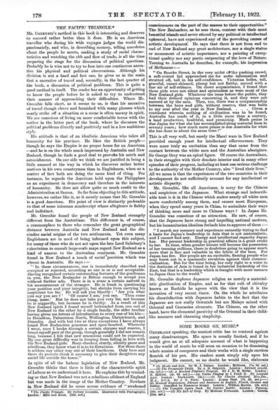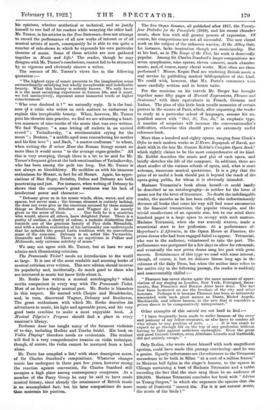SOME BOOKS ON. MUSIC.* GENERALLY speaking, the musical critic has
to contend against many disadvantages. His space is usually limited, and if he would give an at all adequate account of what is happening in the world of music he will seem on occasion to be dismissing whole armies of composers and their works with a single careless flourish of his pen. His readers must simply rely upon his judgment. He cannot, as no doubt he would like, elaborate • (1) Music ad Mfg. By W. f. Tamer. London : Methuen. [7a. ed. net.] —(2) The Promena& Ticket. By A. H. fildgwiek. London : Edward Arnold. [68. net.]—(8) A Musical Pilgrim's Progress. By J. D. M. Rollos. London : H. Milford. (48. 65. net.]—(4) Violin Playing as I Teach It. By Leopold Auer. Lonnon : Duckworth. 16e.]—(6) Sir Charles Stanford, Mus..Nc M.A., D.O.E. By J. F. Porte. London : Regan rain. (78. 6d. net.)-2. (6) Musical Eoressions, Phrases and Sentences in English, French, German and Italian. Compiled by Francesco Berger. London : William Reeves. [2s. net.] —(7) The Complete Opera Book. By Gustav KobbA. London : Putnam. [86s. net.]—(8) My We of Song. By Madame Tetrazzini. London Cassell. 1214. net.) - his opinions, whether aesthetical or technical, and so justify himself to one half of his readers while wearying the other half. Mr. Turner, in his articles in the New Statesman, does not attempt to record the performance of all new works of interest or of all musical artists of merit, consequently he is able to run quite a number of side-shows in which he expounds his own particular theories of music. Some of these articles are now gathered together in Music and Life.' The reader, though he may disagree with Mr. Turner's conclusions, cannot fail to be attracted by so vigorous and obviously sincere a writer.
The essence of Mr. Turner's views lies in the following " quotation :—
"The highest type of music presents to the imagination some extraordinarily satisfying but wholly inexplicable and indefinable beauty. What this beauty is nobody knows. We only know it is the most satisfying experience in human life, and it must, we feel instinctively, represent some immortal truth or higher consciousness."
" Who ever doubted it ? " we naturally reply. It is the busi- ness of a critic who writes on such matters to endeavour to explain this inexplicable beauty. When, however, Mr. Turner puts his theories into practice, we find we are witnessing a heart- less massacre of nine-tenths of the music that was ever written. We find Wagner, "a man letting off rockets in an excited crowd " ; Tschaikovsky, "a sentimentalist crying for the moon " ; Brahms, "a middle-aged man remembering his mother and his flint love " ; and Bash, "a master-craftsman" to whom, when writing the B minor Mass the Roman liturgy meant no more than it would mean "to the average organ-grinder." All this is very sweeping, though there is a lot to be said for Mr. Turner's frequent gibes at the lush emotionalism of Tschaikovsky, who has been among the gods too long. But Mr. Turner is not always so bloodthirsty. He mollifies us with his immense enthusiasm for Mozart, in fact for all Mozart. Again, his appre- ciations of Max Reger, Seriabin, Delius and Debussy are both penetrating and just. For instance, when writing of Debussy he shows that the composer's great weakness was his lack of intellectual power and character :— " Debussy gives us in his music -winds, skies, water, and airy spaces, but never man ; the human element is entirely lacking. He does not even give us the emotions aroused by these natural things as Beethoven, Schubert and Wagner do ; he merely gives us the sense of them. . . . One feels he is a musician who would, above all others, have delighted Pater. There is a purity of outline, a clarity of colour, a melodic distinction that reminds one of the gracious beauty of Pico della Mirandola, and with a sudden realization of his nationality one understands that he upholds the grand Latin tradition with its marvellous sense of the concrete. Debussy is an artist like Verroechio, Donatello and Cellini. There is no mysticism in Pelle'as and Meliaande, only extreme subtlety of sense."
We may not agree with Mr. Turner, but at least -we may admire such illuminating criticism.
The Promenade Ticket 2 needs no introduction to the world at large. It is one of the most readable and amusing hooks of musical criticism ever written. This new edit-km should increase its popularity and, incidentally, do much good to those who are interested in music but know little about it.
Mr. Rorke has written a musical autobiograiphy 3 which merits comparison in every way with The Promenade Ticket. Most of us have a shady musical past. Mr. Rorke is blameless in this respect. He started with Chopin and Mendelssobs, and, in turn, discovered Wagner, Debussy and Beethoven. The great enthusiasm with which Mr. Rorke describes his adventures in music, his light and agreeable prose, and his very good taste combine to make a most enjoyable book. A Musical Pilgrim's Progress sh,ould find a place in every amateur's library.
Professor Auer has taught many of the foremost violinists of to-day, including Heifetz and Toscha Seklel. His book on Violin Playing' therefore needs no credentials. The student will find it a very comprehensive treatise on violin technique, though, of course, the violin cannot be mastered from a book alone.
Mr. Porte has compiled a lisks with short descriptive notes, of Sir Charles Stanford's compositions. Whatever changes music has undergone in these past few years, however strong the reaction against convention, Sir Charles Stanford still occupies a high place among contemporary composers. As a member of the Parry Group he may be said to have made musical history, since already the renaissance of British music is an accomplished fact, but his later compositions do more than maintain his position.
The five Organ Sonatas, all published after 1917, the Twenty- four Preludes for the Pianoforte (1919), and his recent chamber music, show him with still greater powers of expression. Of course, his compositions are not all successful. The new choral work on the subject of the unknown warrior, At the Abbey Cate, for instance, lacks inspiration though not musicianship. But at his best, as in The Songs of the Fleet, his work is deservedly popular. Among Sir Charles Stanford's larger compositions are seven symphonies, nine operas, eleven concerti, much chamber music, and, of course, many choral works. How often are these performed ? Messrs. Kegan Paul are rendering British music a real service by publishing musical bibliographies of this kind. We could wish, however, that Mr. Porte's comments were more carefully written and in better taste.
For the musician on his travels Mr. Berger has brought together sonic fifty pages of Musical EzTressions, Phrases awl Sentences,6 with their equivalents in French, German and Italian. The plan of this little book recalls memories of certain posters in the streets of Paris, which, after requesting the reader to study at a particular school of languages, assume his un. qualified assent with " Oui, Si, Yes, Ja," in emphatic type. A number of misprints will increase the conversationalist's difficulties, otherwise this should prove an extremely useful reference book.
More than a hundred and eighty operas, ranging from Gluck's Orfeo to such modern works as L' Heure Espagnole of Ravel, are dealt with in the late Mr. Gustav Kobbe's Complete Opera Book which rightly claims to be the most comprehensive of its kind. Mr. Kobbe describes the music and plot of each opera, and briefly sketches the rife of the composer. In addition, there are short studies of the various schools of opera, and, what is most welcome, numerous musical quotations. It is a pity that the price of so useful a book should put it beyond the reach of the opera-going public, for whom it is obviously intended.
Madame Tetrazzinre book about herself—it could hardly be described as an autobiography—is neither for the lover of music nor for the lover of literature. No doubt the indefatigable reader, the amoeba as be has been called, who indiscriminately devours all books that come his way will find some amusement in the financial transactions, the popular triumphs, and the trivial recollections of an operatic star, but to our mind three hundred pages is a large space to occupy with such matters. Madame Tetrazzini, when she was scarcely sixteen, made a sensational start in her profession. At a performance of- Meyerbeer's L'Africaine, in the Opera House at Florence, the prima donna who had been engaged failed to appear. Tetrazzini, who was in the audience, volunteered to take the part. The performance was postponed for a few days to allow for rehearsals, and eventually the new prima donna sang her part with great success. Reminiscence of this type -we read with some interest, though, of course, it lost its delicate bloom long ago in the columns of the daily Press, but when the author later refers to her native city in the following passage, the reader is suddenly and unaccountably chilled
"Florence has never shown quite the same measure of appre- ciation of my singing as London, New York, Petrograd, Sacra- mento, San Francisco and Buenos Aires have done. The last four have bestowed on me the freedom of the city and other honours. Perhaps it is because Florence haa been so intimately associated with such great names as Dante, Michel. Angelo, Machiavelli, and others famous in the arts that it considers A prima donna to be comparatively unimportant."
Other examples of this naiveté are not hard to find:— " I have frequently been made to suffer because of the envy and jealousy of my fellow-creatures, as also have to confess all who attain to any position of note. . . . It is toe much to expect to go through life on the top of any profession without having to fight against malicious onslaughts. Even the great arid good General Gordon, even Abraham Lincoln and Garibaldi, did not entirely escape." • Only Berlioz, who wrote about himself with such magnificent egotism, could have made this passage convincing—and he was a genius. Equally unfortunate are thereferences to the Tetrazzini mausoleum to be built in Milan "at a cost of a million francs," to Mexican bull fights in the singer's honour, to the square in Chicago containing a bust of Madame Tetrazzini and a tablet recording the fact that she once sang there to an audience of 250,000. Madame Tetrazzini concludes her book with "Advice to Young Singers," in which she expresses the opinion that the mu* Of Donizetti " cannot die. 'or is it not natural "'mak, the music of the birds ? "



































 Previous page
Previous page